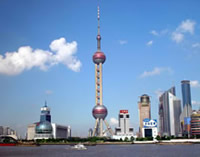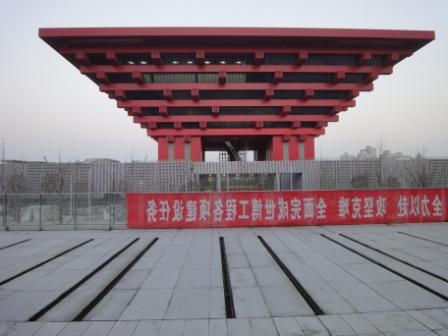|
|


ADVERTISEMENT
Buy Your own advertising
spaces!
.
Download Adobe Acrobat Reader to open [PDF] files.
Recent Visitors
End of Expo: Why Expo 2010 Mattered
2010. 31 October
 by Adam Minter
by Adam Minter
(shanghaiscrap.com) The personal and professional interests of the foreign media in China have never had much in common with the average Chinese people with whom they cover. Sometimes, this is a good and necessary thing: if the foreign media won’t cover Chinese dissidents, who will? But often, this produces absurd results that distort – for readers and viewers outside of China – what matters to China.
Take, for example, the near obsession that China’s foreign correspondents have with Jia Zhangke, a very good Chinese filmmaker who makes “serious,” socially conscious films that have almost no audience in China, but which win awards abroad. This year, during the Expo, the New Yorker (to choose just one English language publication) devoted thousands of words to Mr. Jia. Fair enough, I suppose, except for the fact that – at the same time Jia Zhangke was appealing to a decidedly small audience of hyper-educated New Yorker writers, readers, and editors, the turnstiles at Expo 2010 – the Shanghai World’s Fair – were rotating at a rate that eclipsed Jia Zhangke’s entire Chinese audience by noon, every day, May to October. If New Yorker readers wanted to know something about why people were rushing through those turnstiles, they’d have to look elsewhere because, aside from a few blog posts, the magazine published nothing on Expo 2010 – the biggest and most expensive event that ever took place in China (and, some argue, anywhere). Of course, the New Yorker, and its terrific China correspondent weren’t along in this choice of coverage – they were joined in the decision by most of the China-based foreign media (and their overseas editors). What a pity.
If you believe the official figures, Expo 2010 was visited by more than 70 million people, many millions of whom waited in long ticket lines, outside of the gates, in the heat of July and August (to be sure, quite a few visitors also received their tickets for free), for the chance to wait in long lines within the Expo grounds. The obvious question is: what was the appeal? The less obvious question is: why didn’t the foreign media probe this question? More precisely, rather than ignore the phenomenon, why didn’t anyone pause to ask what was it about contemporary China that drove so many people to do something that most foreigners – especially foreign reporters who are lock-step disdainful of crowds and mass events enjoyed by Chinese – had no interest in doing?
I’ve been dismayed by the number of reporters and expatriates who’ve ascribed the huge attendance figures to lemming-like Chinese behavior, and free tickets (see recent posts and comments on my blog, for starters). Leaving, for another time, the elite mindset necessary for a foreigner (much less, a foreign reporter) to dismiss the interests of the locals as being mechanical and totally manipulated by the CCP, let’s just assume that rural Chinese aren’t much different than hyper-educated foreign reporters. And what I mean by that, as a foreign reporter who attended the Expo more than fifty times, is this: the folks who attended Expo, either in groups or on their own, were many things (aggressive, enthusiastic, patient), but never once did I sense that they were stupid, or so lacking in other options that they’d willingly spend hours in line, in the heat of August, for something that didn’t interest them – just because they received free tickets. [Below, Chinese visitors to the sublime Iceland pavilion.]
Or let’s put it this way: it’s very easy, I think, to stand atop the Expo Boulevard, look down at the six-hour line outside, say, the Saudi Arabian pavilion, and imagine that you’re look at a bunch of lemmings with free tickets. But is that really the best, much less only, explanation? Or is there something else going on down there? Could it be, just possibly, that all of those people are curious to know something about a country capable of spending (reportedly) well over $100 million on a pavilion, and lacking the opportunity to travel there themselves (unlike most Expo critics in the foreign media), are taking the only route available to them? Six hours, in that sense, may not be such a long time. Alternatively, rather than ascribe deep aspirational meaning to those lines, (or lemming-like behavior), it might be better to take a simpler approach: tens of millions of Chinese went to the Expo to enjoy themselves. They did, told their friends and family, and – as the figures show – attendance built.[ Below, the line for the Saudi pavilion at 8:00 PM, the second to last night of the six-month Expo.]
So why do I think Expo 2010 mattered? Lots of reasons, but for now I’ll focus on a favorite.
Non-Asian foreigners who have lived or traveled in China, outside of the big cities, all share a common experience: at some point, someone is going to want to have their picture taken with you. And, along the way, they’ll likely tell you that you’re the first foreigner that they’ve ever met (even though they’ve been watching foreign faces on television screens for decades). Now, there’s two ways one can take this experience: you can roll your eyes and think ‘what a bunch of hicks,’ or you can accept it graciously and hope that you made a decent impression as a First Foreigner. At Expo, this experience was had by non-Asian staff and volunteers millions of times. According to some of the young, fresh-faced American college students who worked the lines outside of the USA pavilion, they often posed for over 100 photos per daily shift, sometimes more. It wasn’t just the Caucasians, either: a staff member at an Arab pavilion who would normally dress in his country’s traditional garb, told me that he began dressing in jeans and T-shirts because the number of photo requests made it impossible for him to move through the grounds.
James Fallows, my friend and long-time correspondent for the Atlantic, picked up on why this matters in a way that correspondents based here never did. Writing, after his first few hours at the Expo, Fallows noted:
Shanghai Expo of 2010, whose most devoted attendees appear to be small-town and rural Chinese folk, serving the same role the St. Louis World’s Fair did for Midwestern Americans a century ago — giving them a glimpse of what the wide world might look like, since they are not likely ever to see it themselves. Strangely uplifting.
‘Uplifiting’ is an interesting choice of words, and one that I like quite a bit, both because I identify with it, and because most of the foreign media who came into contact with the Expo had the opposite reaction. It’s all a matter of perspective, I suppose, but I can’t help but conclude that – in the end – if Expo 2010 failed to teach China’s foreign correspondents anything about China, it certainly should have taught the Chinese something very important about the foreign correspondents – and very little of it to their credit.
Addendum: Just got off the phone with a journalist friend who challenged me to give him three stories that he missed at Expo. Fair enough.
But first – as a catty fellow journalist: if a journalist has a multi-billion dollar event in his back yard, one attended by 200+ countries, tens of thousands of foreign staff, visited by hundreds of foreign leaders and bureaucrats, not to mention tens of millions of Chinese, and can’t manage to find a decent story, say, every week or so, then that journalist’s reporting license should be revoked. I mean, seriously.
Second, I must concede that, from a reporter’s perspective, the Expo was a better feature than it was a news story. But that’s what most of the foreign correspondents in China do: they look for small events and blow them up (sometimes absurdly) into bigger events that (supposedly) explain some greater trend in China. For example, in recent weeks, while Expo was hosting 1 million visitors per day, the New York Times decided to run a story on dog ownership in China, comically titled (am I the only one who laughed at this?) “Once banned, dogs reflect China’s rise”– a story on friggin’ Chinese pet ownership that’s been done dozens of times over the years (including, I concede, by me).
This reporter, if he had time to write about dogs as a symbol of China’s rise, surely also had the time to report on these Expo-related incidents and trends, and blown them into “China’s rise” or other trend stories: the fight that broke out (early in the Expo) between Palestinian and Israeli pavilion staff (launch point for nice weekend-y feature on how int’l tensions are reflected at Expo); Expo security’s detention of Omani pavilion staff for wearing sports jerseys with numbers on them sensitive to Chinese bureaucrats (launch point for discussion of tensions between China and Arab countries on Muslim minorities); the numerous corruption episodes involving various national pavilions (don’t get me started); national pavilion concerns (and actions taken) in regard to economic and other types of espionage occurring at Expo (multi-day feature on economic espionage in Asia); the poor relations between many Chinese contractors and the national pavilions (Hello Forbes! Hello Fortune!); the numerous deals sprung, negotiated, and closed in VIP suites, etc etc (where was the WSJ’s VIP-suite correspodent). I could go on all day.
And finally, how about a feature that explores why Chinese people continued coming to the event despite the crowds, the heat, and the bad press? Was there something there – something that the average foreign correspondent didn’t understand or share – that motivated Chinese visitors? Expo 2010 was the biggest, baddest and widest walking China/international relations metaphor that anyone has ever seen. And alas, it’s going to be up to the feature writers, the historians, and novelists to tell us all about it, and why it mattered. The foreign correspondents, and their editors back home, totally missed it.





Expo was a very wide target not only missed by foreign correspondents but by far, far too many foreign residents in Shanghai who perversely stuck to fashionable cynicism and false ennui to beg off going to this singular event right in their own backyard. That does not, however, inhibit their sniping comments about an event they only know secondhand from a very few journalists.
Comment by ScottLoar — October 31, 2010 @ 8:57 am
There really was practically no press about the Expo here in the states. World’s Fairs historically have been tremendous, amazing events bringing together…well…the world and showcasing innovation and cooperation. It saddens me that so many people have become so cynical and insular that they can’t open themselves up to the wonder of such a thing. I’ve imagined how cool it would be to go the fair ever since I was a kid and heard about the Knoxville fair in ’82.
A year ago, I had the opportunity to visit a friend in Shanghai who was there teaching English, and obviously I couldn’t miss hearing about 2010. And seriously, that was the first time I had heard about it. The whole energy of the thing stirred up those dreams of Knoxville all over again, and my friend and I decided to go back (she returned to the states last fall after her gig ended) and visit her friends, and go to the fair.
And it was so worth it. What a trip. An amazing venue, an amazing amount of people (when you go to Shanghai and people tell you they don’t want to go to the Expo because it’s so crowded, that’s saying something!), and just an impressive thing all around. Something I can tell the kids about someday.
I wish that everyone could not focus so much on the negative parts of this. It seems like China is always an easy target for that sort of criticism, but let’s have some perspective. Nothing of this magnitude is clean. Olympians take drugs, and Olympic committees raze communities. Everything comes at a price, and corruption is part of the human nature. But in the end, the organizers pulled it off.
I think Mr. Fallows’ comparison to St. Louis is spot-on. A billion people were only a train ride away from a once-in-a-lifetime opportunity to see and learn about people and places they had only seen on tv or read about in books. I flew 9000 miles for that same opportunity. How fortunate for all 70 million of us.
Good job, China. I, for one, think your World’s Fair was amazing, and I’m sad that after tomorrow I’ll never be able to walk down those same boulevards and gaze upon the stunning architecture, gorgeous scenery and friendly crowds.
Comment by Mike — October 31, 2010 @ 9:56 am
[...] has published the full transcript of Premier Wen Jiabao’s speech at the Expo today. On Shanghai Scrap, Adam Minter writes about why he thinks the Expo was a significant story that was ignored by much [...]
Pingback by Shanghai Bids Farewell to Massive World Expo Fair | China Digital Times (CDT) — October 31, 2010 @ 2:10 pm
[...] Expo sympathiser, Minter has lamented the patchy coverage of the event given by China’s community of foreign correspondents. What [...]
Pingback by Parting thoughts on the Shanghai Expo « …in Shanghai — October 31, 2010 @ 2:15 pm
For me as a visitor (4 visits, mostly for events) and experienced international traveler, the Expo sucked. I also thought the 2000 Expo in Hannover, Germany sucked (the architecture was less impressive and the U.S. didn’t even bother to participate). The Expo concept is irrelevant to many international travelers (more on this later).
But the Expo was not about me. It was for the ~98% of Chinese who have never left China, and many of whom will never have the opportunity. That’s why I think China is one of the places where the Expo still works well (good luck to 2015 Milan, but I think Europe is a terrible place to hold an Expo, far too many have seen the ‘real’ deal of foreign nations). But I’m glad that hunger to discover the world exists here in China as strongly as anywhere else. Hopefully visitors learned new things about new countries, though I fear that much of the content in the pavilions was of mediocre quality at best. Still, I think many truly enjoyed it.
On the cynical side, the number of visitors I saw who waited in line for hours and then ran through the actual pavilion just to collect the stamps, does lead me to question ‘lemming-like behavior’ and whether they were just showing off for friends back home. But perhaps that reflects more upon the poor content of many of the pavilions than it does the visitors.
The World Fair (Expo) is a confusing and poorly conceived event (how many people remember 2008 Zaragoza, 2005 Aichi, or even 2000 Hannover, the last ‘major’ Expo? –yes, there are ‘major’ and ‘minor’ Expos, don’t ask). The Expo asks government bureaucrats to design Disneyland, around some weak theme, that most pavilions ignore anyway — ‘Better City, Better Life’? In the end, I’d say leave Disneyland to the pros, and it should arrive in Shanghai around 2013. I bet it’ll be received at least as well as the Expo and probably offer far more bang for the buck, for Chinese and foreigners alike. So my problem is with the Expo concept itself, rather than Shanghai’s execution, which was world-class.
I’m extremely fortunate, even spoiled, to have had the opportunity to travel to around the world, which rather ruins the Expo for me. The countries aren’t exotic or magical, as they likely are to other less-traveled visitors. There’s very little in life that I’d wait in line for more than an hour for. I enjoyed the architecture and was impressed by the inside of the UK’s seed cathedral, but that was about it–most other attractions were lame and way too crowded, with overpriced food and drink. And I think that’s the viewpoint from which many foreign correspondents approached it. But that’s not the story for the overwhelming majority of Chinese.
Regarding foreign press, Expo disinterest is not limited to China. In fact, I think Shanghai’s Expo received far more press than previous Expos, as it should have. Still, I agree with Adam that there were many stories and angles that the foreign press missed here–certainly a far better tie-in than ‘dog ownership’!
Comment by Kai Lukoff — October 31, 2010 @ 3:41 pm
got an email today from a friend, she has gone there more that 20 times, and the last ten days straight. big emotional feelings that it is ending.
as an aside, i am learning to not read almost all western journalism writing about china, at least without a bucket of salt near at hand.
Comment by gregorylent — October 31, 2010 @ 4:57 pm
Source: shanghaiscrap.com